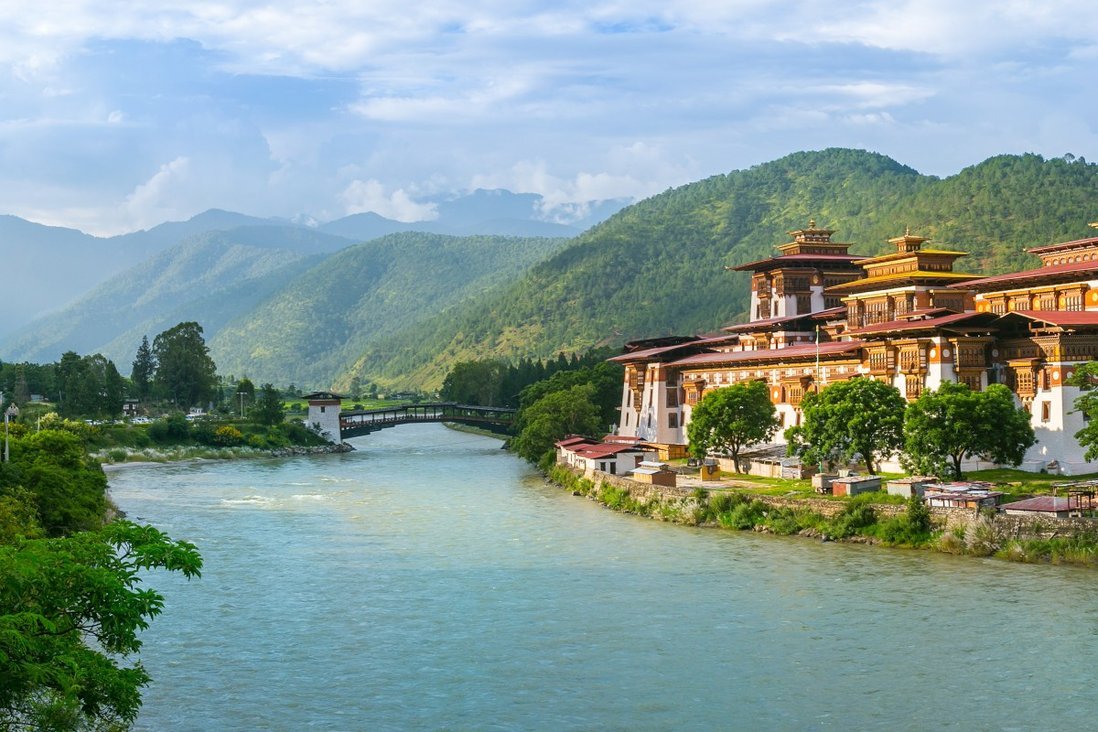
“Peace and Tourism“
The World Tourism Day 2024 theme provides a unique opportunity to reflect on the role of tourism in fostering global peace.
While "peace tourism" might traditionally be associated with sites of historic conflicts, it extends beyond this. Peace tourism, including eco-tourism and cultural preservation, promotes peace worldwide through the positive impacts of tourism.
Bhutan, known as the "kingdom of happiness" and a premier international tourism destination for unique culture and natural beauty, stands at the forefront of this effort alongside many others promoting harmony through tourism– by prioritising sustainable practices and honouring cultural diversity.

The Past:
Healing Through History: The Journey of Peace Tourism
Historically, the connection between peace and tourism was largely centred around "peace tourism," which focused on historical conflicts and reconciliation. This association emerged in the wake of significant global events’ conclusions, such as wars and civil strife, where sites of historical significance became central points for reflection and healing.
Destinations like the Berlin Wall in Germany, the Hiroshima Peace Memorial in Japan, and the Apartheid Museum in Johannesburg, South Africa attracted visitors seeking to understand the impacts of conflict and the importance of harmony and peace.
The Apartheid Museum
The Hiroshima Peace Memorial
The Berlin Wall
The 9/11 Memorial & Museum
Peace tourism often aims to educate travellers about the past, fostering a sense of empathy and awareness about the consequences of war and violence.
This emphasis on historical narratives provided a framework for global communities to share their stories, promote understanding, and work towards healing, laying the groundwork for a broader understanding of peace in the context of global tourism.

The Present:
Tourism, Contributing to Peacebuilding
With historical reflection as the foundation, the present landscape of peace and tourism has expanded to encompass a more holistic approach.
Today, the focus on peace and tourism extends beyond historical narratives to include the positive impacts tourism can bring to communities; most significantly, through preserving resources and fostering understanding and respect towards differences.
This shift reflects a growing awareness of the interconnectedness of peace, cultural understanding, and ecological health around the globe. Modern travellers are increasingly seeking travel experiences that not only honour the past but also promote responsible engagement with local communities and ecosystems.
As a result, tourism now embraces a broader mission to contribute to peace: fostering harmony by promoting social justice, human rights, and sustainable development.
Ecotourism
encourages travellers to develop a deeper appreciation for nature through direct interaction, fostering a harmonious relationship between humans and the environment.
Many destinations around the world promote ecotourism by leveraging their natural ecosystems through educational field trips, volunteering opportunities, and other immersive experiences.
Cultural Preservation
is the involvement of local communities in the decision-making process to enhance the quality of the outcomes and foster creativity and innovation.
It also creates meaningful interactions between visitors and the host community, leading to respect and cultural sensitivity that contributes to peace.
Many destinations are now making significant efforts to protect and promote their culture, including the traditions of the indigenous or ethnic groups, the preservation of cultural heritages and more.
The Case of Bhutan
Bhutan has been implementing the “High Value–Low Impact” sustainable tourism development policy that focuses on maximising tourism revenue while prioritising the preservation of the environment and socio-cultural heritage. It aims to attract mindful visitors who can appreciate Bhutan’s unique culture and natural beauty responsibly.
This policy deeply links ecotourism and cultural preservation, offering visitors opportunities to immerse themselves in Bhutan's natural landscapes while sustaining its rich traditions and cultural heritage.
Ecotourism…
A key component for fostering peace in tourism that promotes environmental sustainability and conservation.
Bhutan reopened for tourism in 2022 with a focus on quality service and environmental preservation. The SDF has increased and then reduced by a haft in 2023 as a balance point to attract more tourists and provide unforgettable experiences for visitors while protecting its natural heritage.
🌱 Ecotourism Project
The Global Environment Facility (GEF) Ecotourism Project, led by Bhutan’s Department of Tourism, focuses on enhancing sustainable tourism across the country.
The project aims to strengthen the rural economy by promoting wildlife-focused tourism, creating job opportunities, and fostering a deeper connection between communities and nature. It includes diverse ecotourism products and activities like homestays, birdwatching, nature adventures, and local festivals.
🔎 Similar concepts are also commonly seen applied in Thailand
Thailand is a popular location for ecotourism because of its efforts to protect the environment and cultural heritage. It promotes sustainability through cultural events, native customs, and the purchase of locally produced items provided in attractions close to historical landmarks and local inhabitants.
Golden Triangle Asian Elephant Foundation
Witness the work of the innovative Golden Triangle Asian Elephant Foundation (GTAEF) in northern Thailand co-funded by Four Seasons Tented Camp Golden Triangle and Anantara Golden Triangle Elephant Camp & Resort. The sanctuary has advocated for the humane treatment of elephants for over ten years. The pachyderms live in a secure, tranquil, and natural environment with their mahouts, or handlers.
💰Sustainable Development Fee (SDF)
By applying a daily Sustainable Development Fee (SDF) for tourists, Bhutan hopes that it would establish tourism as a high-value sector and draw tourists who are prepared to make monetary contributions to the country's development and preservation efforts.
🔎 We can find similar example in Maldives
The Maldives Tourism Act imposes a daily green tax on tourists staying in the country, depending on the type of accommodation.
The collected green tax is deposited into the Maldives Green Fund dedicated to financing climate change mitigation efforts and other environmental initiatives.
🔎 And in Bali, Indonesia
Taking proactive steps to ensure a sustainable and enjoyable experience for visitors, Bali imposes the visitor tax (~USD 10/day) to fund local infrastructure and services. It is in alignment with the governor's new regulations to promote cultural respect and environmental preservation.
Cultural Preservation…
Allows local communities to maintain their cultural identity and underpin social cohesion.
Sustainable tourism practices not only protect local traditions and practices but also bring people together through mutual understanding facilitated by cultural exchanges.
🕺Community Festivals,
“Thimphu Tshechu“
Bhutanese culture is enriched by lively festivals, as almost every village celebrates Thimphu Tshechu, a religious annual festival lasting three days. These gatherings showcase mask dances, traditional music, and social interactions that bonds the community with cultural traditions. These events draw tourists who help bolster the local economy, ultimately aiding in the preservation of the culture.
🔎 It is also witnessed in Papua New Guinea.
Source: Kutubu Kundu and Digaso Festival
Kutubu Kundu and Digaso Festival (KKDF)
Initiated by the World Wide Fund for Nature, the Kutubu Kundu and Digaso Festival aims to revive some of the lost cultures and to highlight the significance of the natural and cultural heritage of the area. It offers a rare treat of fascinating cultural performances from all over the Southern Highlands and promotes the collaboration and sharing of traditional practices among 40 local communities from the Lake Kutubu region.
🗣️Language Preservation,
“Dzongkha“
The government of Bhutan actively encourages the use of Dzongkha, the national language, to strengthen cultural continuity. Educating Dzongkha is compulsory in schools, ensuring that the language continues to thrive and is widely used.
This effort extends beyond local people to tourists; the Department of Tourism in Bhutan elucidates travel etiquette on its official website to educate its visitors prior to their visitors. You can learn some useful Dzongkha words to apply on trips, such as “Kuzu zangpo la” (hello) and “Kadrin chey la” (thank you).
🔎 It is also seen in Hawaii.
ōlelo Hawai‘i
One of the four pillars of Hawaii’s 2025 tourism strategic plan is the Hawaiian Culture Pillar, aiming to support native Hawaiian culture & community. Some of the programmatic actions are funding programmes that revitalise and normalise ‘ōlelo Hawai‘i (Hawaiian language) and working with the University of Hawai‘i to ensure that all Hawaii Tourism Authority-funded scholarships include coursework in Hawaiian Studies and Hawaiian Language.
🪭 Cultural Tourism
Bhutan boasts a variety of sophisticated architectures influenced by Buddhism, traditional music and arts, unique textiles, and more. Bhutan prioritises cultural immersion in its tourism development approach– educating visitors about the local culture and generating revenues for cultural preservation projects. Tour guides are also trained to familiarise tourists with local customs and etiquette, to promote respectful interaction and encourage understanding.
🔎 It is found in Vietnam, as well.
In Vietnam National Administration of Tourism (VNAT)’s 2030 vision, cultural tourism is set to account for 15-20% of the total tourism revenue. To achieve so, VNAT has mapped out a blueprint for each region to develop its distinct cultural products. For instance, showcasing the cultural identities of ethnic minorities in the midland and mountainous areas of Northern Vietnam, highlighting the wet rice civilization from Red River Delta and coastal Northeast, and so on.
They have also prioritised promoting tangible and intangible cultural values, as well as investment in cultural tourism to accelerate the recovery and promote sustainable tourism.

The Future:
Towards a Culture of Peace
The relationship between Tourism and Peace will become even clearer in the future: To play a crucial role in building a peaceful and sustainable world.
As a cultural bridge, tourism facilitates the exchange of ideas, customs, and perspectives. When people from different backgrounds travel and interact, they better understand each other's cultures, breaking down stereotypes and fostering empathy. This increased understanding can help to mitigate conflict and build stronger relationships between nations.
Tourism plays a crucial role in maintaining global sustainability. Ecotourism helps protect natural resources, preserve cultural heritage, and create sustainable livelihoods for local communities, nurturing peace and happiness for current and future generations. Additionally, tourism can significantly contribute to economic development, particularly in marginalised or conflict-affected regions. Creating jobs, generating revenue, and improving infrastructure can help reduce poverty, improve living standards, and strengthen local economies, ultimately promoting greater stability and peace within communities.
To fully realise the potential of tourism as a force for good, we must adopt a responsible and sustainable approach. Governments, businesses, and individuals must work together to ensure that tourism benefits all stakeholders, protects the environment, and contributes to a more harmonious and equitable world.
Bhutan is an example of maintaining and developing sustainable tourism by utilising tourism development as a tool to promote and preserve the country's valuable resources.
Proven to be a feasible approach to reshaping its tourism, Bhutan's "high-value, low-impact" vision will continue to guide its tourism industry in attracting more responsible travellers and prioritising Gross National Happiness (GNH), sustainability, and cultural preservation for a more peaceful and harmonious future.





























